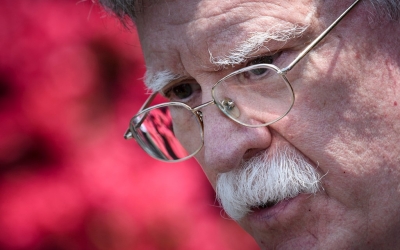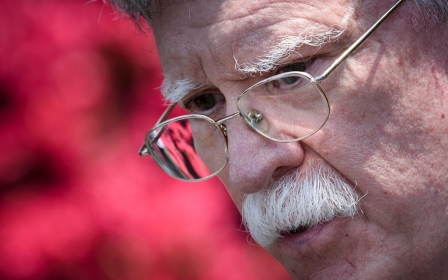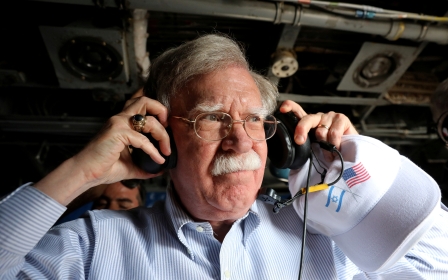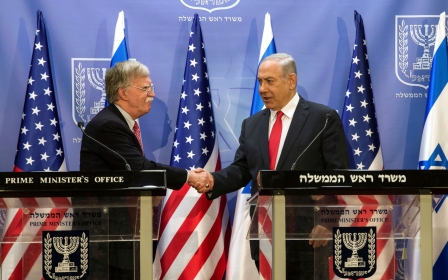Trump sacks national security adviser John Bolton
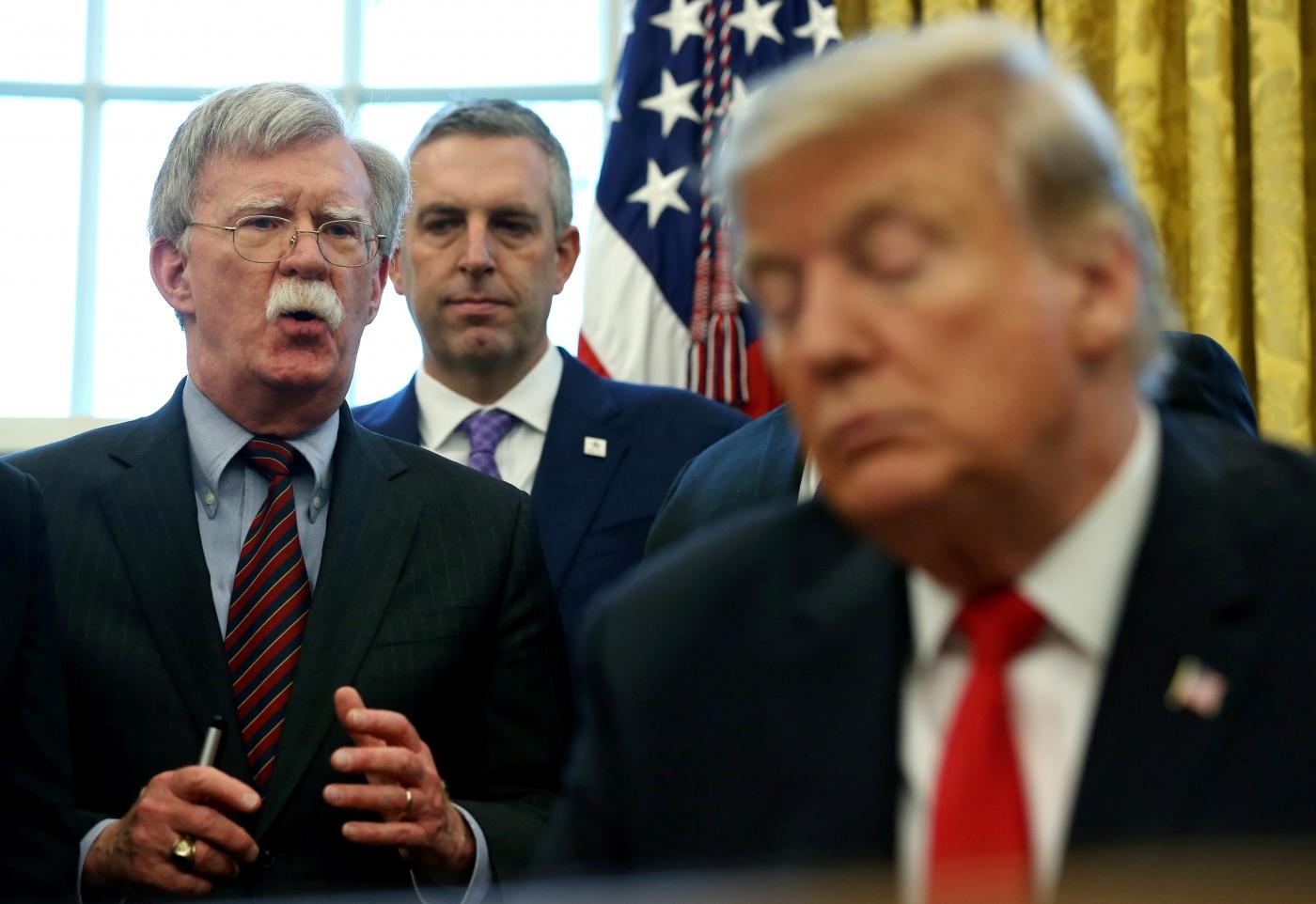
John Bolton, a senior Trump administration official and anti-Iran hawk, has resigned, in a move that was welcomed by Iran experts and politicians in Washington, among others.
US President Donald Trump first announced on Tuesday morning that he had asked Bolton to resign, tweeting that his services "are no longer needed at the White House".
"I disagreed strongly with many of his suggestions, as did others in the administration, and therefore I asked John for his resignation, which was given to me this morning. I thank John very much for his service," Trump tweeted.
The president said he plans to name a replacement for Bolton next week.
New MEE newsletter: Jerusalem Dispatch
Sign up to get the latest insights and analysis on Israel-Palestine, alongside Turkey Unpacked and other MEE newsletters
Bolton served as Trump's national security adviser, a White House-based position that involves aiding the president on foreign policy and national security issues.
Bolton, who has served in every Republican administration since Ronald Reagan's presidency, is known for his neo-conservative, hawkish foreign policy views.
More recently, his hardline, anti-Iran views garnered attention amid an uptick in tensions between Washington and Tehran.
Shortly after the president's announcement on Tuesday, Bolton tweeted that he offered to resign on Monday night.
"I offered to resign last night and President Trump said, 'Let's talk about it tomorrow,'" he wrote on Twitter.
'I think he's been a major impediment to diplomacy. He is a war-monger. He's somebody who's advocated for bombing Iran'
- Barbara Slavin, Atlantic Council
Barbara Slavin, director of the Future of Iran Initiative at the Atlantic Council, a Washington-based think tank, welcomed Bolton's departure from the administration.
"I think it's great," she told Middle East Eye in a brief interview on Tuesday afternoon.
She said it is still unclear how Bolton's ouster may affect Iran-US relations, but added that the now-former Trump aide has been an "impediment to diplomacy".
"Bolton is an absolutist; it's all or nothing, black and white. He's not very good at step-by-step or incremental agreements, and those are the only kinds of agreements that are realistic with adversaries," Slavin said.
"So I think he's been a major impediment to diplomacy. He is a war-monger. He's somebody who's advocated for bombing Iran, as recently as this past summer, and he has ties with the Mujahideen-e Khalq, an Islamo-fascist cult. So I'm glad he's out."
Anti-Iran hawk
Bolton had been labelled the architect of the Trump administration's "maximum pressure" campaign against Iran that began last year when Washington pulled out of the 2015 multinational nuclear deal with Tehran.
In early 2017, just days before Trump took office, Bolton backed the incoming president's pledge to scrap that accord. He joined Trump's White House in April 2018, succeeding General HR McMaster who had resigned as national security adviser a month earlier.
The Trump administration then proceeded to slap sanctions on various Iranian government agencies, companies and individuals, all part of the pressure campaign.
But Bolton has said in the past that sanctions alone do not work.
"The inconvenient truth is that only military action ... can accomplish what is required," he wrote in a 2015 New York Times column entitled "To stop Iran's bomb, bomb Iran".
His snap resignation comes amid efforts to ease heightened tensions between the two countries, and as Trump has left the door open to talks with his Iranian counterpart, President Hassan Rouhani.
The US president also recently cancelled planned negotiations with the Taliban, which Bolton had argued against, according to the Washington Post.
Bolton said he didn't want to appear on television to defend some of the Trump administration's positions, particularly on Afghanistan and Russia, the newspaper reported on Tuesday, citing unidentified administration officials.
At odds with Trump
Bolton was a staunch supporter of the war in Iraq, backing the US-led invasion in 2003 when he served in the State Department as under secretary of state for arms control and international security.
Later, as US ambassador to the United Nations between 2005 and 2006, he defended then-president George W Bush's foreign interventions.
'His extreme policies have undermined our global leadership and national security. Good riddance'
- Democratic Representative Barbara Lee
Bolton is the third national security adviser to serve during the Trump administration's first term.
His predecessor, McMaster, had replaced General Michael Flynn, a staunch Trump supporter who resigned 18 days into his tenure over lying about a phone call he had with the Russian ambassador to Washington late in 2016, before the new administration took office.
US media outlets reported earlier this year that Bolton and Trump were increasingly at odds over several foreign policy issues.
In particular, Bolton's fondness for military interventions stood in contrast to Trump's "America first" stance and pledge to stop foreign wars.
"The world view of regime-change is that if anyone has a different foreign policy than we do, it must be because they're wrong, and if they hold to it, they must be removed," former US diplomat Christopher Hill told Middle East Eye in May.
"So, it is a statement not only of 'America first' but 'America only'."
Mixed reactions
On Tuesday afternoon, US Republican Senator Rand Paul commended Trump for sacking Bolton, calling the move a "necessary action" while implying that Bolton's hawkish policy positions contributed to his ouster.
"The president has great instincts on foreign policy and ending our endless wars. He should be served by those who share those views," Paul tweeted.
Democratic lawmakers, for their part, criticised the president for ever making Bolton one of his top advisers.
"John Bolton never should have been national security advisor in the first place," tweeted Democratic Representative Barbara Lee.
"His extreme policies have undermined our global leadership and national security. Good riddance," she said.
Others expressed concern over the Trump administration's inability to hold on to key staff members.
Democratic Senator Chris Murphy said he was "shaken" by the news of Bolton's resignation, which he said highlights the "grave instability of American foreign policy today".
"The fact that Trump has fewer people whispering war chants in his ear is good. Bolton was dangerous and that's why I opposed his selection. But it can also be true that the general instability of American security policy and personnel is making us weaker in the world," Murphy wrote on Twitter.
Democratic Representative Gerry Connolly, who serves on the House Foreign Affairs Committee, echoed that sentiment.
Bolton "was the wrong choice from the beginning", Connolly tweeted, but his resignation "underscores the chaos, turmoil, and incompetence" of the Trump administration.
Middle East Eye delivers independent and unrivalled coverage and analysis of the Middle East, North Africa and beyond. To learn more about republishing this content and the associated fees, please fill out this form. More about MEE can be found here.


